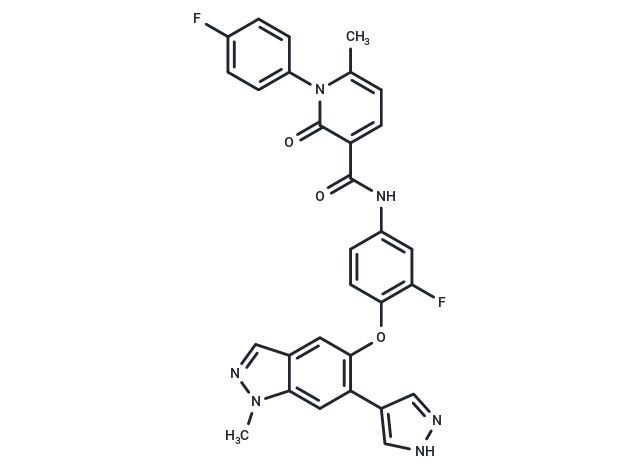Shopping Cart
- Remove All
 Your shopping cart is currently empty
Your shopping cart is currently empty

Merestinib (LY2801653) is an orally available, small molecule inhibitor of the proto-oncogene c-Met (Ki: 2 nM) with potential antineoplastic activity. Merestinib electively binds to c-Met, thereby inhibiting c-Met phosphorylation and disrupting c-Met signal transduction pathways. This may induce cell death in tumor cells overexpressing c-Met protein or expressing the constitutively activated c-Met protein.

| Pack Size | Price | Availability | Quantity |
|---|---|---|---|
| 1 mg | $45 | In Stock | |
| 2 mg | $64 | In Stock | |
| 5 mg | $107 | In Stock | |
| 10 mg | $147 | In Stock | |
| 25 mg | $267 | In Stock | |
| 50 mg | $447 | In Stock | |
| 100 mg | $637 | In Stock | |
| 500 mg | $1,330 | Backorder | |
| 1 mL x 10 mM (in DMSO) | $128 | In Stock |
| Description | Merestinib (LY2801653) is an orally available, small molecule inhibitor of the proto-oncogene c-Met (Ki: 2 nM) with potential antineoplastic activity. Merestinib electively binds to c-Met, thereby inhibiting c-Met phosphorylation and disrupting c-Met signal transduction pathways. This may induce cell death in tumor cells overexpressing c-Met protein or expressing the constitutively activated c-Met protein. |
| Targets&IC50 | MET:2 nM(Ki) |
| In vitro | Merestinib demonstrates in vitro effects on MET pathway-dependent cell scattering and cell proliferation. It demonstrates more potent anti-proliferative activity in cell lines with MET gene amplification (MKN45, Hs746T and H1993) than the cell lines without MET gene amplification (U-87 mg, KATO-III). Merestinib also maintains potency against 13 MET variants, each bearing a single-point mutation. It is found to have potent activity against several other receptor tyrosine oncokinases including MST1R, FLT3, AXL, MERTK, TEK, ROS1, DDR1/2 and against the serine/threonine kinases MKNK1/2. The mean IC50 value of Merestinib for inhibition of MET auto-phosphorylation in HGF-stimulated H460 cells is 35.2±6.9 nM and the IC50 for MET auto-phosphorylation in S114 cells is 59.2 nM[1]. |
| In vivo | Merestinib shows in vivo anti-tumor effects in MET amplified (MKN45), MET autocrine (U-87 mg, and KP4) and MET over-expressed (H441) xenograft models; and in vivo vessel normalization effects. It is able to induce vessel normalization in xenograft tumors. Among the species studied, Merestinib has the shortest elimination half life in mice of 2.9 h, compared with 14.3 h in non-human primate. Merestinib is currently in phase 1 Clinicalal testing in patients with advanced cancer[1]. |
| Kinase Assay | The Ki value and mode of inhibition of LY2801653 for the MET kinase activity are determined using a radiometric filter-binding assay. Reactions are carried out in 96-well plates in Enzyme dilution buffer (EDB) compose of 50 mM Tris HCl pH 7.5, 2 mM DTT, 0.005% Triton X-100, 10 mM MgCl2, and 250 ?M EDTA. Serially diluted LY2801653 (final concentration 250 to 0 nM) are followed by the addition of a series of 8 concentrations of 33P-γ-ATP (final concentration 400 to 10 μM ATP), and 5 nM enzyme (final concentration). After a 2-hour incubation, PolyGluTyr synthetic protein substrate (final 150 μg/mL) is added to initiate the 30-minute kinase reaction. Reactions are quenched with 10% H3PO4, transfer to a pre-wetted Multiscreen anionic phosphocellulose 96-well filter plate, and washed; radioactivity is measured with a scintillation counter. The experimental data are fit to a global mix model inhibition equation using GraphPad Prism softwar to generate an alpha value to determine the modality of inhibition and to calculate the Ki value for LY2801653[1]. |
| Cell Research | 2×103 DU145 cells/well on poly-D-lysine 96-well black/clear plates are treated with LY2801653 (in 0.4 % DMSO), immediately followed by the addition of human HGF (20 ng/ml), and incubated for 48 h at 37 °C. 2 % formaldehyde fixed cells are stained with AlexaFluor 488 Phalloidin and counterstained with Propidium Iodide. Colony counts are quantified on Acumen Explorer? laser-scanning fluorescence microplate cytometer. A colony is defined as≥4 cells.(Only for Reference) |
| Alias | LY2801653 |
| Molecular Weight | 552.53 |
| Formula | C30H22F2N6O3 |
| Cas No. | 1206799-15-6 |
| Smiles | O(C1=C(C=C2C(=C1)C=NN2C)C=3C=NNC3)C4=C(F)C=C(NC(=O)C=5C(=O)N(C(C)=CC5)C6=CC=C(F)C=C6)C=C4 |
| Relative Density. | 1.42 g/cm3 (Predicted) |
| Storage | Powder: -20°C for 3 years | In solvent: -80°C for 1 year | Shipping with blue ice. | |||||||||||||||||||||||||||||||||||
| Solubility Information | H2O: < 1 mg/mL (insoluble or slightly soluble) Ethanol: 93 mg/mL (168.32 mM), Sonication is recommended. DMSO: 93 mg/mL (168.32 mM), Sonication is recommended. | |||||||||||||||||||||||||||||||||||
Solution Preparation Table | ||||||||||||||||||||||||||||||||||||
Ethanol/DMSO
| ||||||||||||||||||||||||||||||||||||

Copyright © 2015-2025 TargetMol Chemicals Inc. All Rights Reserved.